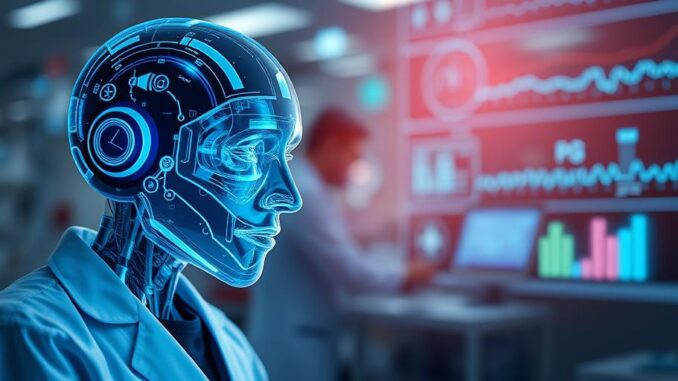
Summary
Artificial intelligence (AI) is rapidly transforming healthcare, offering benefits like improved diagnostics, personalized treatments, and streamlined administration. This article explores the latest advancements in AI integration within the medical field, highlighting its potential to improve patient care and address systemic challenges. From automating tasks to accelerating drug discovery, AI’s impact on healthcare is profound and continues to evolve.
** Main Story**
AI: Reshaping Healthcare – It’s Not Science Fiction Anymore
Let’s be honest, artificial intelligence in healthcare isn’t some far-off fantasy anymore; it’s happening right now. We’re seeing a real transformation, from smarter diagnoses to treatments that are actually tailored to you. The impact? It’s pretty profound, promising better results for patients and a smoother ride for medical professionals. It’s April 27, 2025, and trust me, things are moving fast.
Smarter Diagnosis, Personalized Care: AI to the Rescue
One of the coolest things AI is doing is analyzing those complicated medical images. Think X-rays, CT scans, MRIs – the whole shebang. And guess what? These algorithms can often spot tiny anomalies and diagnose diseases way earlier than a human radiologist might. Earlier detection, less invasive treatments…it all adds up to better outcomes. I mean, who wouldn’t want that?
Then there’s the personalized treatment angle. AI can dig into a patient’s data, like genetics and lifestyle, to create a treatment plan that’s just right for them. No more one-size-fits-all medicine, people. It’s about maximizing what works while minimizing those nasty side effects. It’s about getting the right treatment, for the right person, at the right time.
Healthcare Admin? More Like Healthcare Automated.
It isn’t all about patient care, though. A huge chunk of healthcare involves admin and paperwork and well, generally boring stuff. AI is here to cut through the bureaucracy too. Scheduling appointments, billing, insurance claims – it’s all getting automated. That means less human error, fewer headaches, and more time for healthcare professionals to focus on actually, y’know, caring for patients.
Plus, AI-powered chatbots are offering 24/7 support, answering questions, reminding patients about medications, and even monitoring vital signs remotely. It’s like having a personal assistant that never sleeps, constantly keeping an eye out. Which is pretty cool, if you ask me.
Supercharging Research and Drug Discovery
And hey, AI isn’t just helping us treat diseases; it’s helping us understand them better too. In the research world, it’s like a super-powered data detective. By analyzing massive datasets, AI can spot patterns and predict potential health risks. Imagine, preventing diseases before they even happen. That’s the dream, right?
Drug discovery is also getting a major boost. AI can simulate how drugs will interact in the body, shaving years off the traditional clinical trial process. That means new treatments could hit the market much faster, potentially saving countless lives. For example, I remember reading about this AI-powered platform that cut down the pre-clinical research for a new Alzheimer’s drug by almost half. It’s mind-blowing.
Not All Sunshine and Rainbows: Challenges Ahead
Okay, look, it’s not all sunshine and rainbows. There are challenges we need to tackle. Data privacy and security are huge concerns. We can’t just throw patient data around without thinking about the consequences. And what about biases in the algorithms? If the data used to train the AI is biased, the AI will be too. Ethical considerations are something we need to take seriously.
That said, as AI gets more sophisticated and we get better at handling data, its potential in healthcare is only going to grow. I can see AI playing a bigger role in preventative medicine, personalized care, and just overall healthcare management. It’s an evolving landscape, but the transformation is undeniable. Still it needs constant checking, you can’t just leave it to diagnose patients, I feel. It is a tool, not a replacement.


The point about AI-powered chatbots providing 24/7 support is interesting. What are your thoughts on the potential impact on healthcare accessibility for underserved populations, especially those in remote areas or with limited access to traditional medical services?
That’s a fantastic point! I agree that 24/7 support offers huge potential for underserved populations. The ability for people in remote areas to access medical information and advice, regardless of location or time, could be transformative. We need to ensure these tools are designed to be accessible and culturally sensitive for maximum impact.
Editor: MedTechNews.Uk
Thank you to our Sponsor Esdebe
The potential for AI to accelerate drug discovery, particularly by simulating drug interactions, is a game-changer. What impact do you think this will have on personalized medicine, allowing for treatments tailored to individual genetic profiles and responses?